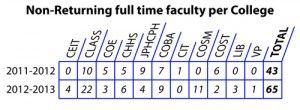Faculty changes threaten morale
October 31, 2012
Changes within Georgia Southern University’s faculty over the past two years may jeopardize the reputation of its large scale, small feel campus.
The number of full-time employees who did not return rose from 43 in the 2011-2012 school year to 65 employees not returning for the 2012-2013, according to documents requested for non-returning full-time, regular faculty for academic year 2011-2012 and 2012-2013.
This list excludes full-time temporary faculty, full-time visiting faculty, part-time faculty and graduate assistants.
“I have had a 50 percent increase in the number of students in my classes,” Dr. Michelle Haberland, an associate professor of history at GSU, said.
108 faculty members did not return over the course of two years, and of those faculty members 98 were professors, associate professors or assistant professors, according to the non-returning faculty documents.
“There are still a number of positions that are still open,” Dr. David Dudley, chair of the literature and philosophy department at GSU, said.
Dr. Dudley has spent a 20-year career in education at GSU and plans to retire from GSU, but with recent changes within faculty and administration, Dudley has seen a change in the morale of his fellow colleagues and friends.
Dr. Jean Bartels, provost and vice president of academic affairs, ensures that administration is doing all it can to help improve morale among professors and faculty members.
“We are doing the best we can with very limited resources,” Bartels said.
“The vast majority of the morale issues stem from faculty members unable to receive pay raises over the past four years which is difficult to deal with considering how the cost of insurance and the cost of living has increased,” Bartels said.
While the lack of a pay increase is a frustrating factor for faculty, one of the biggest issues for some faculty members is that with pressure from the administration to increase graduation rates, the quality of teaching is being jeopardized.
“The biggest issue for faculty is maintaining the quality of teaching and making sure that educating students does not get lost with all the different changes that are going on with the university,” Haberland said.
With the increase in class sizes, professors have had to administer all multiple choice exams as opposed to exams that give students the ability utilize their critical thinking skills, Dr. Michael Moore, professor of reading at GSU, said.
Administration has begun taking steps to make adjustments, such as establishing office hours and hiring under the complete college plan in order to improve graduation rate and hire more faculty, Haberland said.
The complete college plan is a full effort by universities across Georgia to increase graduation rates. It is projected that by 2020, over 60 percent of jobs will require some sort of college degree, according to GSU’s Complete College Georgia.
“We have added 36 new full-time tenured faculty lines this year. That’s a small step but at least a step in the right direction,” Bartels said.
“We are looking at additional ways that we can perhaps translate temporary faculty into more permanent kinds of positions as well. Obviously budget constraints hamper a little bit of how quickly we can do that because you can’t add a lot of faculty without costing lots of money, so we are really looking for ways to focus the budget so we can do that in the future,” Bartels said.
Bartels said administration is also working on different strategies to ensure that students will still be able to get one-on-one attention.
Arielle Coambes contributed to this report.









